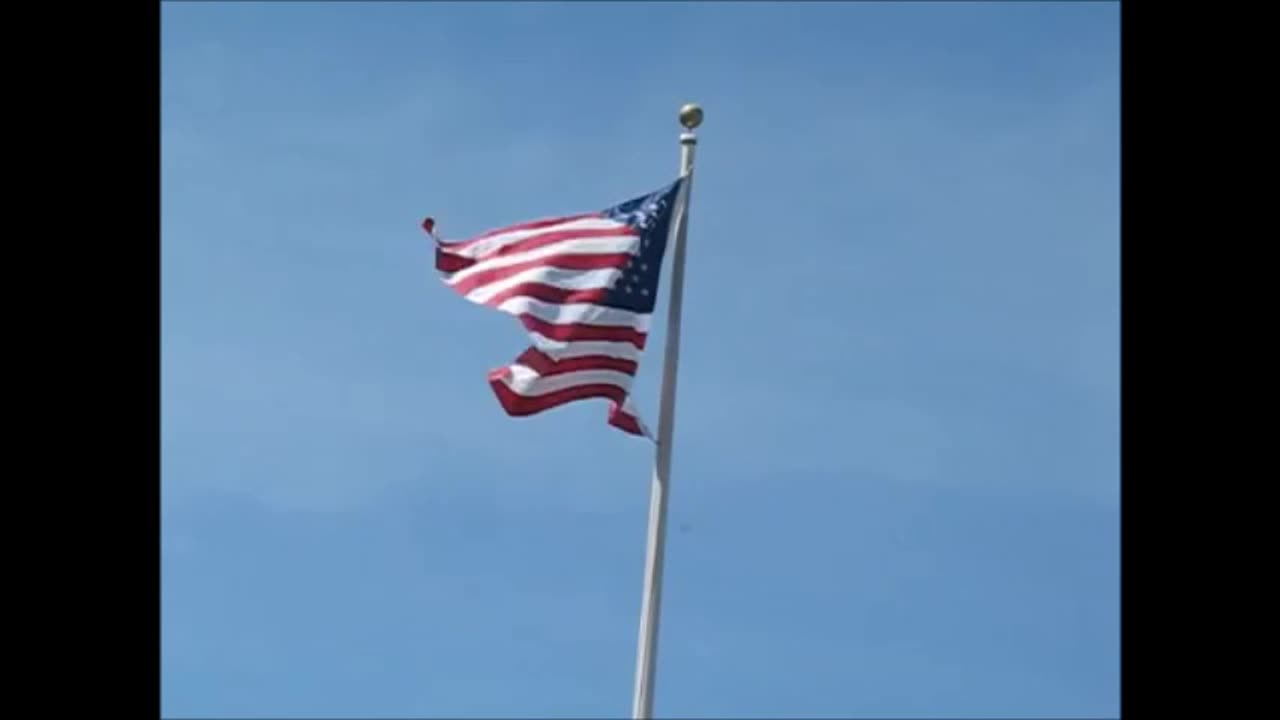Premium Only Content

Sing Your Song for America. A short Americana patriotic song.
Sing Your Song for America
Sing your song for America
Sing it loud and free
Sing it for the world to hear
Sing your song for me
Sing your song for America
Sing with harmony
Sing it so the words are clear
Sing your song for me
The future may look darker
But we've been here before
I can see the bright lamp lit
Beside the golden door
Sing your song for America
A lovely melody
Sing the song from coast to coast
Sing your song for me
Words and music by The Author.
Copyright 2024
All Rights Reserved
BMI
Flag video:
Happy July 4th Everyone!
by Eldon James Brown
Publication date 2014-06-23
Usage Public Domain Mark 1.0
https://archive.org/details/HappyJuly...
The history of U.S. patriotic songs is a reflection of the country’s evolution, capturing moments of unity, triumph, and reflection on the nation's ideals. These songs have served various purposes, from rallying support for wars to celebrating American pride and questioning societal values.
Patriotic music in America began during the colonial era, when settlers brought European traditions with them. Early songs were adapted from European tunes, with lyrics that initially expressed loyalty to the British Crown. However, as tensions with Britain grew, music became a tool for expressing the desire for independence. Songs like William Billings' "Chester" (1770) rallied the colonies against British rule and marked the beginning of distinctly American compositions.
During the Revolutionary War, music played a crucial role in uniting the American colonists. "Yankee Doodle," originally a British mockery, was embraced by the colonists as a symbol of pride and defiance. "The Star-Spangled Banner," written by Francis Scott Key in 1814, became a symbol of American resilience during the War of 1812. The anthem's imagery of the American flag flying after a battle captured the determination of the American people.
The 19th century saw the rise of patriotic songs celebrating American ideals, especially during times of expansion and conflict. Songs like "America the Beautiful," written by Katharine Lee Bates in 1895, celebrated the country’s natural beauty and the virtues of its people. The Civil War further amplified the role of music in shaping national sentiment. Songs like "Battle Hymn of the Republic" became anthems of the Union cause, while "Dixie" became a symbol of Southern pride and resistance.
The World Wars marked a new era for patriotic music. During World War I, songs like George M. Cohan’s "Over There" encouraged Americans to support military action. The upbeat song became synonymous with the American war effort. In World War II, Irving Berlin’s "God Bless America" emerged as an emotional anthem of national unity and divine protection, particularly in a time of global crisis. Its simple message resonated deeply with Americans, particularly as the U.S. became more involved in world affairs.
In the post-war years, particularly during the 1960s, the role of patriotic music began to evolve. The Civil Rights Movement and anti-Vietnam War protests led to songs that not only expressed pride but also critiqued the nation's failures. Woody Guthrie’s "This Land Is Your Land" (1940) became a beloved anthem, but its lyrics also highlighted issues of inequality and the gap between the American ideal and reality.
The 1980s and 1990s saw the emergence of songs that expressed both pride and disillusionment with American society. Bruce Springsteen's "Born in the U.S.A." (1984) became iconic for its chorus of American pride, but its lyrics about a Vietnam War veteran's struggles also reflected the country's internal contradictions.
In the 21st century, patriotic music continues to serve multiple purposes. While "The Star-Spangled Banner" remains central, its performance has sparked debates over protest and free speech. Contemporary songs like Lee Greenwood's "God Bless the U.S.A." continue to celebrate American pride, while others, such as Green Day's "American Idiot" (2004), critique political and cultural directions in the country.
The history of U.S. patriotic songs is an ongoing reflection of American identity. These songs have united citizens in times of war, celebrated the nation’s triumphs, and provided a platform for questioning and critiquing American values. They remain a vital part of the nation's history, always reflecting the ever-changing landscape of the American experience.
-
 LIVE
LIVE
blackfox87
2 hours ago🟢 SUBATHON DAY 3 | Premium Creator | #DisabledVeteran
114 watching -
 14:38
14:38
Nikko Ortiz
18 hours agoADHD vs Autism
44.7K28 -
 LIVE
LIVE
EXPBLESS
2 hours agoArena Breakout (This Game Is Hard But Fun) How Much Can We Make Today? #RumbleGaming
98 watching -
 4:40
4:40
GritsGG
17 hours agoTwo Easter Eggs on Call of Duty Warzone!
35.4K2 -
 2:08:19
2:08:19
Side Scrollers Podcast
1 day agoNetflix Execs to TESTIFY Over LGBTQ Agenda + IGN DESTROYS Xbox Game Pass + More | Side Scrollers
72.4K21 -
 5:08:55
5:08:55
Dr Disrespect
22 hours ago🔴LIVE - DR DISRESPECT - BABY STEPS - THE VERY VERY LAST CHAPTER
150K19 -
 10:28
10:28
BlabberingCollector
18 hours agoAsk Blabs, Episode 5 | Answering Your Wizarding World Related Questions
24.4K2 -
 18:09
18:09
Forrest Galante
5 days agoI Survived 24 Hours In The World's Deadliest Jungle
205K33 -
 LIVE
LIVE
Lofi Girl
2 years agoSynthwave Radio 🌌 - beats to chill/game to
203 watching -
 2:15:09
2:15:09
Badlands Media
22 hours agoOnlyLands Ep. 27: Power Hour Hangover, Trump’s Wartime Shift, and Portland in Flames
134K36
